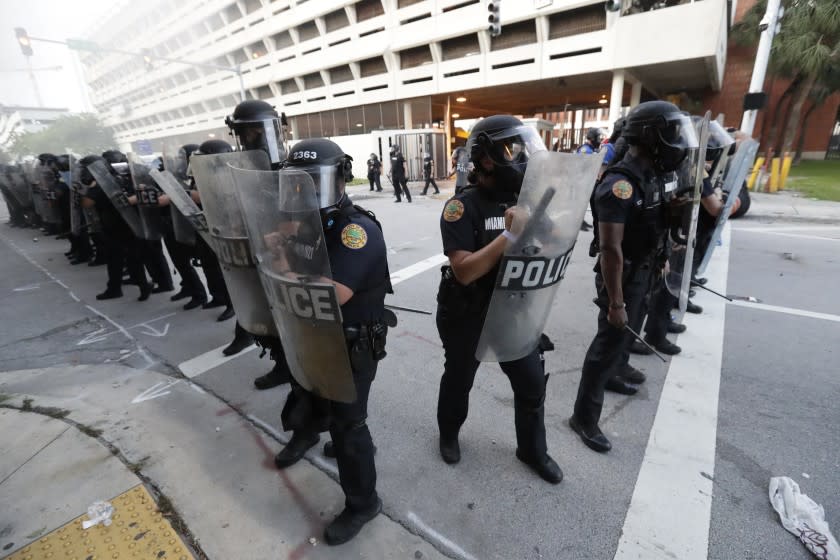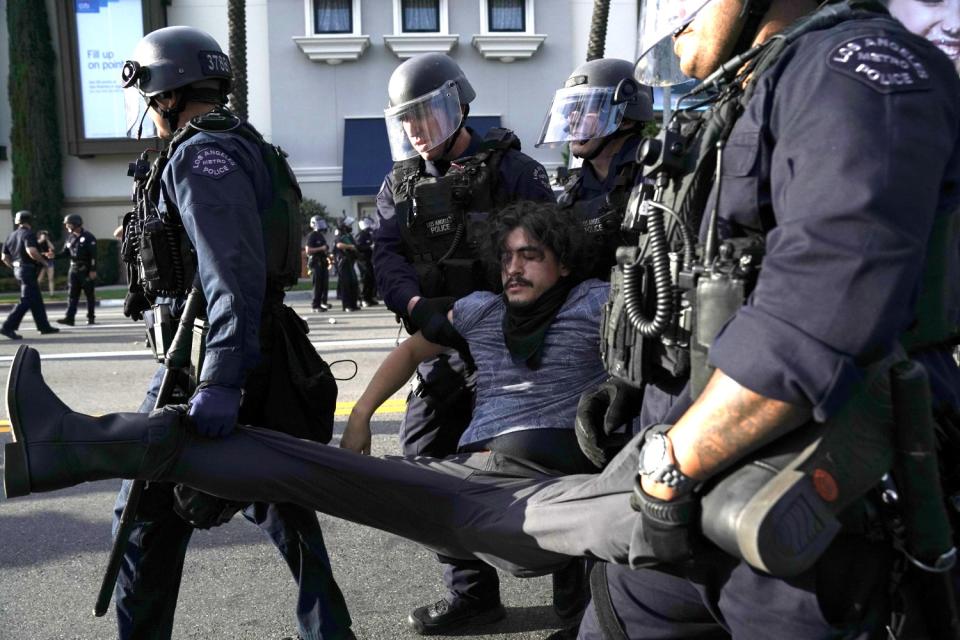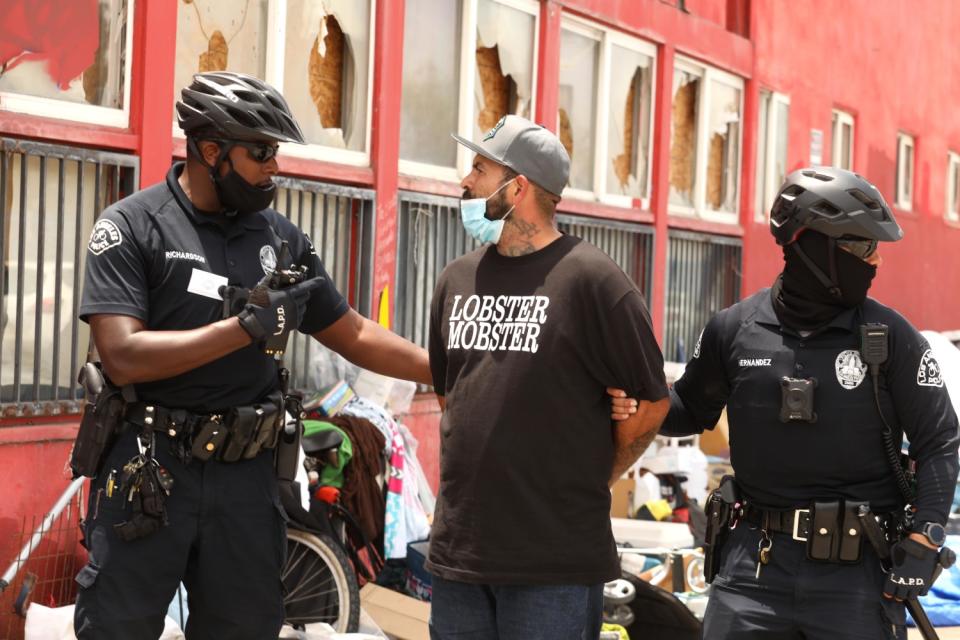'At a loss about what they're supposed to do': Police take on their own kind of protest

The entire SWAT team in the Miami suburb of Hallandale Beach resigned this month, complaining of "disdain" from locals for doing its job.
In Winchester, a central Tennessee town of 8,500, a decade-long cop did the same after posting a video of himself in tears on Facebook while blaming a “crusade” against police.
They joined dozens of officers across the country — cops in Atlanta, Minneapolis and Buffalo, N.Y., among them — who have walked off the job as fellow officers face fierce criticism on the streets and in city halls for killing Black citizens during arrests and assaulting protesters during recent demonstrations.

As the national movement for police reform and racial justice grows, more police are themselves pushing back, saying that they, too, are victims of a public that has painted them with too broad a brush. At the same time, officers have taken their own profession to task, calling for reforms in a job that comes with the raw power to kill.
The reckoning is born out of frustration over generations of systemic racism often personified through police treatment of Black residents and other people of color. Anger has intensified in recent years as videos chronicling deadly encounters have gone viral and messages from movements like Black Lives Matter begin to resonate across racial and political lines.
"After the death of George Floyd, what we are seeing is a major moment in rethinking policing and making it better," said Sam Walker, a professor emeritus at the University of Omaha who specializes in police accountability. "Some police don't want to play by the new rules or think they are unfair, so they put up their own fight."
At least eight police officers quit the force this month in Atlanta, where tensions grew after a video showed a white officer shooting dead a Black man who had struck a cop and fled with a Taser in a Wendy's parking lot.
Then on Wednesday, the day the now-fired officer was charged with murder, the Atlanta police union reported officers calling out of work in "almost every zone and every specialized unit" in the city. The action, which was not organized by the union, was presumed to be a retaliation for the charges against the officer and his partner.
“All officers, at this point, are afraid to do their jobs,” said Vincent Champion, Southeast regional director for the International Brotherhood of Police Officers, who said they felt “nobody has their back.” The union represents more than half of the city's officers.
"Yes, we signed up to protect and serve our communities. We understand the danger. What we didn’t sign on for was to be wrongly accused or not even given the chance to go through the hearing that the same people we arrest and put in jail have the ability to go through.”

Unions like Champion's, among the most powerful among labor groups, have portrayed police as under siege, facing threats and false information that spreads quickly across social media. Some police have taken to social media to push back.
In Delaware County, Pa., a union leader posted to Facebook this month, telling critics: “If you choose to speak out against the police or our members, we will do everything in our power to not support your business.” The union later apologized.
Narratives can also veer out of control. In New York, the Detectives’ Endowment Assn. union tweeted this week that three officers were given "intentionally poisoned" milkshakes at a Shake Shack. It later turned out that the mishap was unintentional, possibly due to a faulty machine cleaning.
Images of a public turned against police don't always match reality. Polls show that a majority of Americans have confidence in police, though trust drops dramatically among Black communities. Surveys have also shown that most Americans support the Black Lives Matter movement and calls for police reforms. While scores of police officers are injured and shot on duty each year, including at recent protests, deadly shootings by police are far more common.
In Dallas, where at least 100 officers staged a "Blue for Black Lives” march this month, scars linger from an incident four years ago, when a man shot dead five officers who were patrolling a Black Lives Matter rally.
Sgt. Michael Mata, president of the 4,000-member Dallas Police Assn., said he feared cities were too quickly changing policing systems in response to the recent unrest. He wondered about police morale.
After protests erupted in the city last month, police banned chokeholds and created a "duty to intervene” if officers saw colleagues using excessive force; a similar policy was in place but not followed in Minneapolis. Officers, he said, were increasingly worried that they would not receive support from their departments when they drew their guns or Tasers.
Still, he said, the death of Floyd "woke up" police. "We have committed serious violations of human rights, human dignity, and we need to make amends."
Dallas has seen thousands rally, including a minority that broke store windows and stole property. While police in St. Louis and Las Vegas have dodged bullets during protests — including an incident that left a Vegas officer paralyzed — those in Dallas have been hit with bottles and rocks from angry crowds.
In Minneapolis, at least seven officers quit and cited a lack of support after Floyd's death, while more than 50 resigned from a special team in Buffalo, N.Y., after two officers faced suspension for shoving a 75-year-old protester to the ground. Mata said such defections were anomalies.
"I don’t think you’re going to see a ‘blue flu,'" he said. "What I think you will see across departments all over this country is officers at a loss about what they’re supposed to do.”
The conversation has, at times, played out over racial lines. As cities embrace the protest mantra of "defund the police" by cutting police budgets and drastically reimagining the role of officers, some Black police groups have put out pointed statements criticizing police even as their white counterparts have at times been resistant or less forceful.
"It is clear that the humanity of Black people appears invisible to law enforcement," the National Black Police Assn. said after Floyd's death.
"No single incident should define an agency or the profession," the International Assn. of Chiefs of Police, where the president is white, said on the same day.
In Fort Worth, the chasm is personal for Tiffany Bunton, 38, a Black officer.
The last weeks have stirred painful memories of her late uncle, who died in the back of a police car two years ago as he pleaded for help because he could not breathe. Christopher Lowe, 55, repeatedly told officers he was dying as he was taken into custody. He died after 13 minutes.
Of the seven white officers involved, three still have their jobs. Bunton, a 15-year member of the force, called that a "slap in the face."

Black police face more public pressure and scrutiny than their white counterparts, she said. Watching Black men and women die at the hands of officers makes it tough to put on the uniform, but also makes her want to improve her profession.
"Being a Black officer right now might be harder than it’s ever been," she said. Some protesters "question your motives [and] say we’re traitors, that we’re in it for the wrong reasons, that they can’t trust us."
Some officers, she said, "don’t want to recognize that there’s an issue. If change doesn’t happen, things are only going to get worse. … I’d like to see some of these chiefs as a whole have a little more backbone, stand up and do what’s right even if it’s not the most popular decision.”
In many cities, change has come from above, not within, the force.
Larger cities including Los Angeles and Boston and smaller ones like Norman, Okla., and Rochester, N.Y., have pledged to cut police funding by tens of millions, though the numbers represent a fraction of current department budgets. Cities have said they'll redistribute the money to educational, mental health and anti-poverty programs, as well as non-police workers who can respond to nonviolent incidents.
In Portland, Ore., where the city announced it would reduce the police budget by $15 million, the police union president scoffed, saying cops were already stretched thin.
"A lot of times we’re the last rung in the ladder when everything else fails," said Officer Daryl Turner, who is Black.
“Most Americans won’t say, ‘Get rid of police,’" he said. "What they will say is, ‘Let’s have reform.’”
Floyd’s death and the national fallout will complicate police recruiting, Turner said. “When we have one officer or a few officers diminish what we do, it makes it harder to talk somebody into doing this job.”
Mike Solan, a Seattle officer and president of the local police union, said some of the blame was on cops themselves.
"We have not successfully explained policing: why we must and have to do certain things when engaging with the public,” said Solan, who represents 1,300 officers in the city.

Solan said police officers were often doing the jobs of social workers instead of crime stoppers. After the city council voted this week to ban tear gas and pepper spray, he questioned how police would protect precincts if marches again turned violent.
East of downtown, a six-block area initially dubbed the Capitol Hill Autonomous Zone surrounds a now-abandoned precinct that was the site of recent clashes between protesters and police. It's become a national symbol for supporters of removing police from communities. Visitors are welcomed with signs that say, "You are entering free Capitol Hill” and “No cop co-op.” Many businesses in the area, part of a lively entertainment district, are open and the area is filled with speakers, music and art during the day.
Solan, who said officers are limited to meeting crime victims on the edge of the zone, described it as a sign of lost influence among police. He believes most Seattle residents still support the police force, but he said the shooting in Minnesota and the uprising that has spread across the U.S. has made it harder to do the job.
"Unfortunately, an egregious act in Minneapolis has been difficult for the Seattle Police Department to overcome and try to reengage with the community to earn their trust back.”
Kaleem reported from Los Angeles and Jarvie from Atlanta. Times staff writers Molly Hennessy-Fiske in Houston and Richard Read in Seattle contributed to this report.

